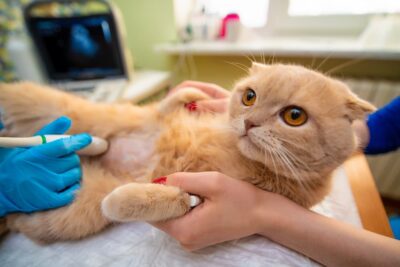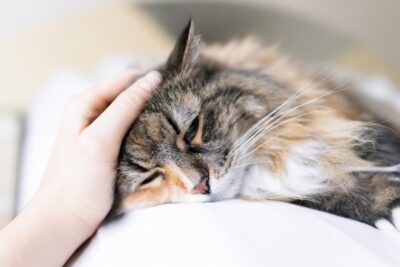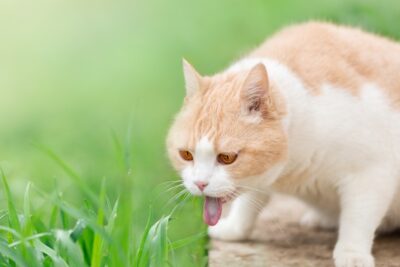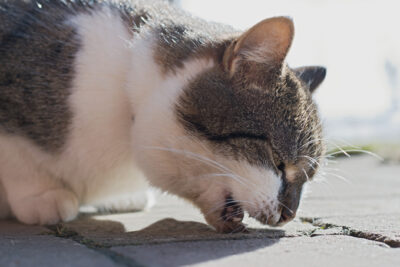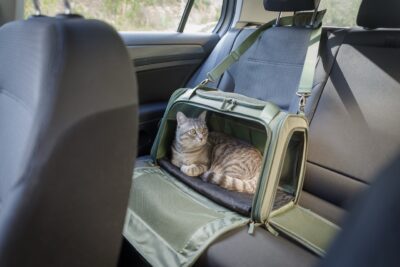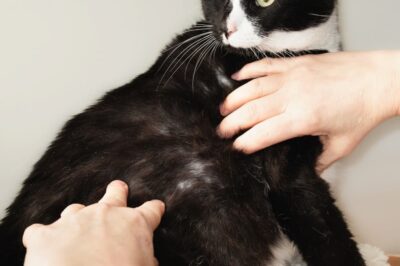Can Cats Get Hiccups
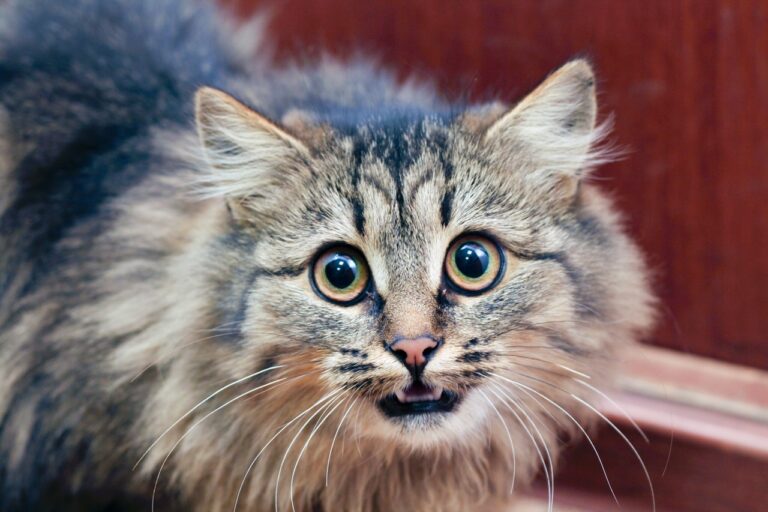
All featured products are chosen at the discretion of the GreatPetCare editorial team and do not reflect a direct endorsement by the author or reviewer.
Imagine this. You’re snuggled up with your kitty when you hear it — a cute little “hic” followed by a tiny belly twitch. It’s adorable, but also puzzling. And it might cause you to wonder, “Can cats get hiccups, or is something else going on?”
According to Dr. Aimee Warner, a veterinary surgeon with Medivet UK, the short answer is: Yes, cats can get hiccups.
Hiccups in cats are involuntary contractions of the diaphragm, the thin, dome-shaped muscle that separates your cat’s heart and lungs from their abdominal organs. These spasms cause cats to suddenly inhale air through their mouths. When the air hits the voice box, the vocal cords close, producing the familiar “hic” sound.
Can Cats Get Hiccups? Should You be Worried?
Is what sounds like a feline hiccup always a hiccup? And is it cause for concern? Here’s everything you need to know about kitty hiccups to put your mind at ease.
“Cat hiccups are fairly subtle and can quite easily be mistaken for other sounds of breathing,” Dr. Warner says. But even if your cat’s hiccups are more pronounced, there’s no reason to worry.
All cats can experience hiccups, regardless of age or breed. And while feline hiccups might look or sound concerning, they are usually totally normal.
Do Kittens Get Hiccups?
Yes, kittens can get hiccups, too. In fact, they may be more likely than adult cats to experience these tiny spasms, especially in their first few months of life. This is because their nervous system and diaphragm are still developing.
Kitten hiccups are often related to how they eat. If they eat too fast, it can cause them to swallow air, which triggers hiccups. Bottle-fed or recently weaned kittens are particularly vulnerable to hiccups, Dr. Warner notes.
Why Do Cats Get Hiccups?
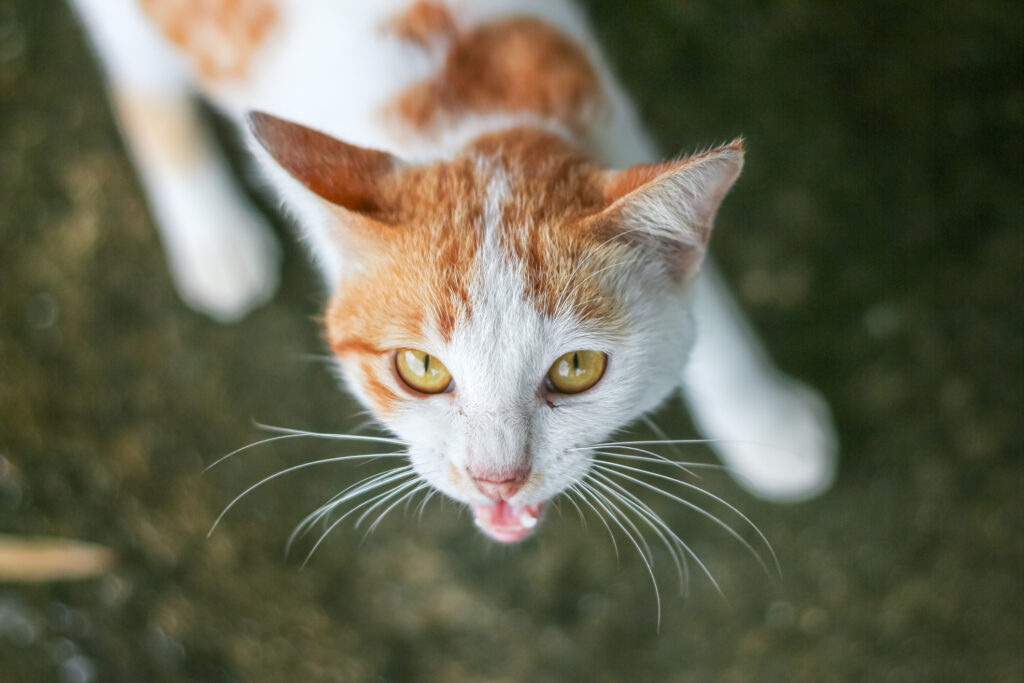
Cat hiccups can be spontaneous and can occur for no reason at all, but certain triggers make them more likely. Common causes include:
- Eating too quickly. “Cats gulping water or food quickly and taking in too much air can trigger spasms of the diaphragm,” says Dr. Warner. “Cats that gulp their dry kibble are especially prone to hiccupping.”
- Cold food or water. Sudden temperature changes from drinking very cold water or eating chilled food can irritate the diaphragm, causing hiccups.
- Stress or excitement after eating. Rough play or running around after a meal can lead to hiccups.
Recognizing Hiccups in Cats
Many cat parents question whether what they’re hearing is a cat hiccup or something else. That’s because feline hiccups are very different from our own. And they may be hard to differentiate from all the other sounds your cat can make.
“Cat hiccups are a quiet, rhythmic “hic” or “chirp” that is a much softer sound than human hiccups,” notes Dr. Warner. “It takes close listening to tell hiccups apart from other noises,” she adds.
Here’s how to distinguish cat hiccups from other sounds your pet produces:
- Coughing: Cat coughs are louder and more forceful than hiccups, often with a “barking” quality.
- Wretching: This sound often signals your cat is regurgitating liquid or food. It involves visible throat movement and often causes cats to throw up. With hiccups, you may detect chest movement but no throat movement, and your cat shouldn’t throw up anything
- Sighing: This longer, more sustained exhale is very different from the short, repetitive nature of hiccups.
Treating Hiccups in Cats
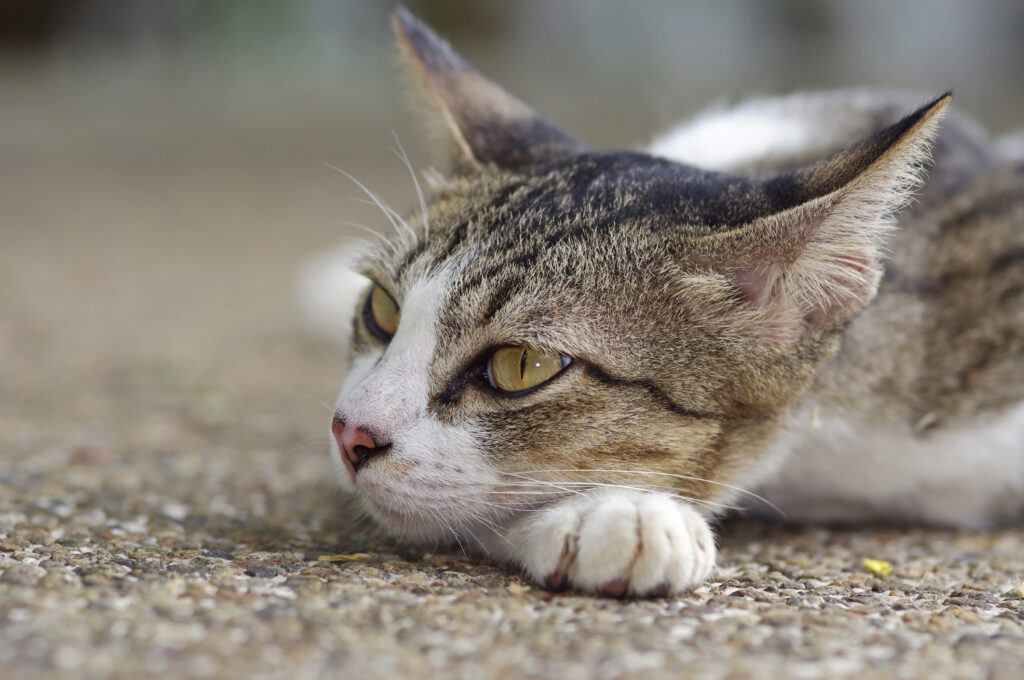
Occasional hiccups are normal and don’t require treatment. “The majority of cat hiccups clear up by themselves in a matter of minutes and are harmless,” Dr. Warner says.
However, if hiccups last more than an hour, happen every day, or are paired with other worrisome symptoms, it’s time to call your vet.
“The frequency and persistence of hiccups should be noted because this can distinguish normal, isolated cases from underlying health issues that deserve a visit to the veterinarian,” Warner adds.
Recurring hiccups in combination with other signs (e.g., labored breathing, poor appetite, lethargy) may indicate underlying health conditions. These can include respiratory illness, gastrointestinal illness or even heart failure.
To diagnose what’s causing your cat’s frequent hiccups, your vet may perform:
- Physical exam to listen to the heart and lungs
- Blood tests to rule out metabolic issues
- Imaging (X-rays or ultrasound) to check for respiratory, gastrointestinal, or cardiac problems
Medications for Cat Hiccups
There are no specific medications to treat mild cat hiccups. However, if hiccups are caused by an underlying condition, your vet may prescribe medications to treat that issue. For example:
Antacids for acid reflux, like famotidine. If your cat isn’t a fan of taking oral medication, ask your vet about compounded options, which are often flavored or formulated to go down easier.

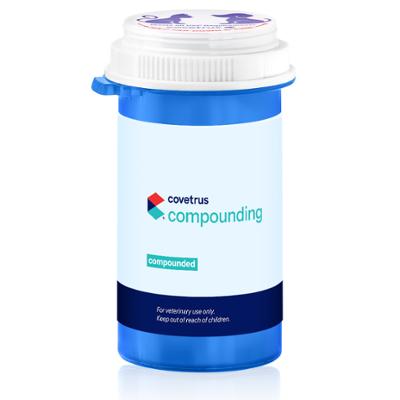
Anti-nausea medications if gastrointestinal upset is involved. Some medications, like Cerenia, are used “off-label” for feline nausea, meaning vets may prescribe it even though it’s not FDA-approved for cats. Always check with your veterinarian before administering any medication to your cat.


How to Stop or Prevent Cat Hiccups
If your cat gets the occasional case of hiccups, you really don’t need to do anything to stop them. Most episodes resolve on their own in a few minutes.
However, there are a few things pet parents should NOT do to “cure” a cat’s hiccups, according to Dr. Warner. She advises steering clear of common suggestions for stopping human hiccups, like scaring your cat or giving them water.
While well-intentioned, these treatments could make hiccups worse or lead to choking, Dr. Warner warns.
If you want to help prevent your cat from experiencing hiccups in the first place, Dr. Warner suggests these tips:
- Use puzzle feeders or slow-feed bowls to discourage your cat from eating too fast.
- Feed smaller, more frequent meals instead of large portions.
- Serve food and water at room temperature.
- In multi-cat households, feed cats separately to decrease competition and stress that can cause cats to eat too quickly.
While cat hiccups are usually no cause for concern, knowing what’s normal (and what’s not) can help you better support your feline friend’s health.
If your cat’s hiccups are occasional, taking a few simple steps can help them eat more calmly and comfortably, which may reduce hiccup episodes.
If the hiccups are persistent, always schedule an appointment with your vet to help rule out underlying health issues. Even if it turns out to be nothing, you’ll enjoy some peace of mind. And if there are larger health concerns, early detection and treatment are the best thing you can provide for your favorite feline.
